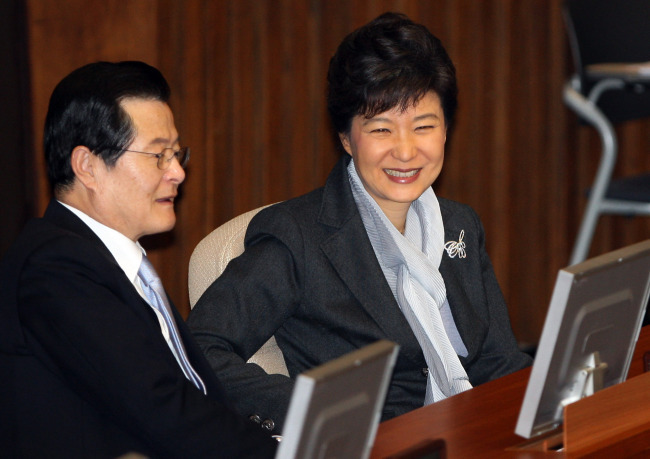 |
박근혜 대통령 당선인이 허태열 청와대 비서실장 내정자와 국회에서 얘기를 나누고 있다. 2010년 파일 사진 (연합뉴스) |
<관련 영문 기사>
Park secretariat seen to be in driver’s seat
By Lee Joo-hee
Stability, familiarity and control appear to be the key words for President-elect Park Geun-hye in forming the new government as she is seen to create a powerful Cheong Wa Dae joined by her close allies, while old-school experts and bureaucrats fill the Cabinet.
The latest designation of veteran politician Huh Tae-yeol as her chief of staff demonstrates her intention to bestow higher political credence to the presidential office, political observers said.
“While criticisms toward concentrated power in Cheong Wa Dae have usually targeted past presidents as well, Park’s signature leadership style, which tends to be relatively more closed off than her predecessors, raises the level of concern that the presidential office could end up enjoying more excessive power,” said politics professor Yun Seong-yi of Kyung Hee University.
After a delayed selection process since her botched first prime minister nomination last month, Park completed the lineup of her prime minister, 17 ministers and top-level presidential secretaries in a week’s time.
Nine of the nominees for ministers are members of the transition committee, such as Yun Byung-se, who is named minister of foreign affairs, Chin Young for welfare and Cho Yoon-sun for gender equality. Minister-nominees Yoon Seong-kyu for environment and Phang Ha-nam for labor are also expert members of the presidential preparation team. As her senior secretary for state planning, her key man at the transition team on government reorganization Yoo Min-bong was tapped.
Many of her Cabinet nominees are also lesser-known figures who are considered to have expertise in their fields.
The two pillars of the Cabinet -- the prime minister and the deputy prime minister of economy -- are held by who critics call “hands-on” figures rather than those with large political clout, thus leaving more power to the presidential office and the president herself.
Former prosecutor Chung Hong-won has been named the prime minister while Hyun Oh-seok, a technocrat and president of Korea Development Institute, was named to become the finance chief.
Overall, of the 17, nine are former bureaucrats while five are professors and researchers. Only three, including Yoo Jeong-bok for public security, Chin and Cho, are politicians.
The main opposition Democratic United Party, which has been slamming Park for her secluded personnel and communication style, lambasted her choices.
“While Park has recruited various figures during the election, she has resorted to experts or those that are easily manageable ever since she won the election,” DUP Rep. Kim Young-hwan said in a radio interview.
He claimed that the prospects are now dim for Park to carry out earlier pledges to demonstrate regional unity and fairness in opportunity for enhanced roles of the prime minister and ministers.
Incoming presidents’ first choices of Cabinet and Cheong Wa Dae have often invited heavy scrutiny in the past.
Outgoing President Lee Myung-bak, for instance, was rigged by the opposition for his penchant for selecting those who graduated from Korea University, his alma mater, go to his Somang Church, or come from his native Gyeongsang region. Former President Roh Moo-hyun was also criticized for his so-called “code-oriented” appointments of high posts that the opponents claimed were based on their similar political and ideological standings without due professional experience.
“It remains to be seen how the members of Cheong Wa Dae position their roles in the future government,” Yoon said.
While the balance of power between the presidential office and the Cabinet largely remains the discretion of the president’s intention, such systematic signs will tell how the incoming government handles it, he said.
They would include actual execution of personnel rights by each minister in naming heads of their affiliate organizations -- an authority already granted by relevant law but rarely practiced in real life.
The authority given to Cabinet meetings presided by the prime minister and the significance of decisions made in such meetings will also show whether the power is balanced out, Yoon explained.
(jhl@heraldcorp.com)



![[Herald Interview] 'Trump will use tariffs as first line of defense for American manufacturing'](http://res.heraldm.com/phpwas/restmb_idxmake.php?idx=644&simg=/content/image/2024/11/26/20241126050017_0.jpg)

![[Health and care] Getting cancer young: Why cancer isn’t just an older person’s battle](http://res.heraldm.com/phpwas/restmb_idxmake.php?idx=644&simg=/content/image/2024/11/26/20241126050043_0.jpg)

